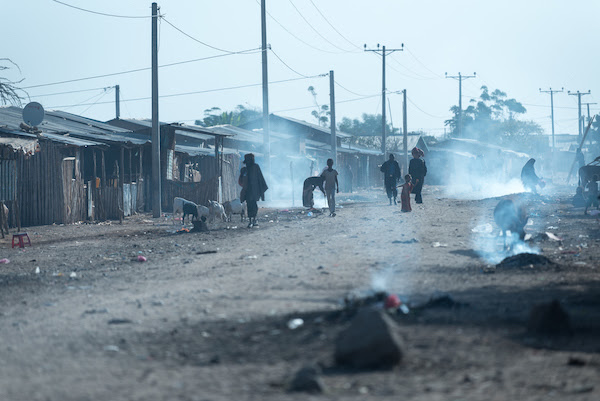“The new United Nations, founded in 1945, bore the hallmarks of the aspirations of the fellowship of churches that it should become an instrument of the world's peoples, not only of the world’s powers. CCIA was created to serve as an organ in formulating the Christian mind on world issues and bringing that mind effectively to bear upon such issues, particularly in relationship with the United Nations and the new post-war system of international governance.” Decisions in briefDelegations for WCC 11th AssemblyThe WCC executive committee confirmed member church delegations and nominated additional delegates. Overcoming racismThe executive committee approved a strategic plan for overcoming racism, racial discrimination and xenophobia realizing that the mandate of a strategic plan could only be a mandate up until the next assembly. The acting general secretary was asked to take the content of this plan into account for the period after the assembly. The executive committee requested to add education and church programmes for children as important instruments in overcoming racism. They also underlined the importance of working with ACT Alliance on such a key topic for both ACT and the WCC. The executive committee requested the establishment of an advisory group with a mandate until the assembly. Pilgrimage of Justice and PeaceThe executive committee discussed the emerging Pilgrimage of Justice and Peace themes beyond the WCC 11th Assembly, and offered advice on the future of the pilgrimage. These plans reflect the ongoing work of the WCC as a Pilgrimage of Justice and Peace. In 2022, there is a regional focus on Europe and a thematic focus on Christ’s love. The plans reflect efforts to harvest the past eight years of work and prepare an assembly that will engage the fellowship in providing direction for the future. Diaconal work of the churches in the context of COVID-19The executive committee discussed and approved the work of the WCC Ecumenical Diakonia Reference Group, which developed an additional resource on the diaconal work of the churches in the context of COVID-19. The document provides an overview of the global context, a theological reflection on churches’ response to the pandemic and the effect of COVID-19 on churches and agencies. It describes the challenges of implementing diaconal work in the context of COVID-19, potential long-term implications, and the response of the churches in serving people. Communications in the 21st centuryThe WCC executive committee received the outline of work on a proposal for developing a new paper on communications for the 21st century, and asked the WCC acting general secretary to continue developing the draft paper for presentation to the central committee.The digital revolution is transforming our world and creating new ways of interacting beyond the boundaries of time and space. It offers powerful tools for living in relation with others, for inclusion, education, encounter, imagination, creativity, and understanding, as many have experienced during the COVID-19 pandemic. International Coalition for West PapuaThe executive committee approved a proposal for WCC serving as the interim host of coordination and advocacy for the International Coalition for West Papua, a network of faith-based and civil society partners focused on monitoring, reporting and collaboration in advocacy initiatives on the human rights situation in West Papua. The International Coalition for West Papua is undergoing an organizational development review to address structural concerns. In the interim, Bread for the World has asked the WCC to act as project holder for one year to ensure the continuation of programmatic activities. Accountability reportThe WCC executive committee reviewed an accountability report entitled “Pilgrims on the Path of Peace: The Journey of the WCC from Busan to Karlsruhe,” affirming the revised draft and timeline, and forwarded the report to the WCC central committee for approval in February 2022. Programme plans and budget 2022The executive committee received and approved the programme plans and budget 2022, noting that there would be particular focus for programmes in preparations for the assembly. The pre-assemblies in 2022 would also provide inspiration and guidance for trends in future programmatic work. Towards planning for 2023The executive committee determined that draft plans 2023, prepared in spring 2022, would be subject to review by the executive committee in June 2022, before being forwarded to funding partners. Financial mattersThe WCC executive committee received the report of the audit committee, and approved the updated internal controls’ scoping matrix, in accordance with its responsibilities under Swiss law. An amendment to the investment objectives for the general investment fund was approved. The budget for 2022 was approved, together with the capital expenditure limit for 2022. The executive committee also approved the WCC 11th Assembly budget while noting that income includes estimates which remain to be confirmed, and which could therefore evolve in 2022. Green VillageThe executive committee approved the strategy for sale of the Kyoto land and building, as well as the parallel action to seek bridging finance, as may prove necessary for construction works currently underway. The executive committee also considered the strategy for Stockholm, planned as an office building with six floors, to be sold by floor. Given the results of studies in relation to possible land lease, and the recommendations of the steering committee in this respect, the executive committee also approved the strategy for sale of land for the Stockholm project, which will be launched for sale in 2022 in the development phase, before delivery of a building permit. WCC executive committee member shares reflection on “how are we called to act in love and justice?” (WCC press release of 15 November 2021) WCC executive committee “reimagining the future” with a sense of hope (WCC press release of 12 November 2021) WCC executive committee to hold first in-person meeting in two years (WCC press release of 12 November 2021) Link to the statements: WCC executive committee appeals for 'fundamental conversion towards just and sustainable future' after COP26 | World Council of Churches (oikoumene.org) WCC executive committee appeals for peace in Ethiopia | World Council of Churches (oikoumene.org) WCC executive committee calls “conscience of the world” to “obstruction of legitimate Palestinian aspirations for equal human dignity and rights” | World Council of Churches (oikoumene.org) Military coups in Myanmar and Sudan “an unconscionable assault,” states WCC executive committee | World Council of Churches (oikoumene.org) WCC Commission of the Churches on International Affairs’ “ministry of witness and action critically needed” | World Council of Churches (oikoumene.org) WCC executive committee welcomes the establishment of UN Permanent Forum of People of African Descent | World Council of Churches (oikoumene.org) | 






No comments:
Post a Comment